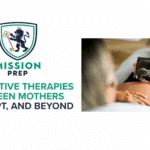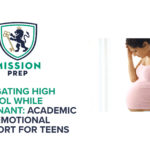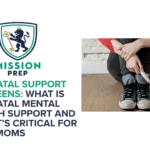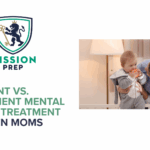Supporting Teens Through Unplanned Pregnancy: Top Tips and Resources


In 2024, the teen birth rate in the United States was 12.7 births per 1,000 among teens aged 15 to 19.¹ And of this number, more than 75% of teen pregnancies are considered unplanned.²
Helping teens with unplanned pregnancy means helping them through one of the most challenging experiences of their lifetime. Most teenagers are still figuring out who they are – what they value, how they see themselves, and where they belong. A pregnancy, especially one they didn’t plan, can feel like a sudden interruption to all of it.
An unplanned teen pregnancy is undoubtedly an overwhelming reality for the average teen. When the shock of finding out they’re pregnant hits, some teens go quiet while others start to panic. Without the right guidance and emotional support for pregnant teenagers, they can make decisions that put their, and their baby’s, life at risk. Research shows that around 15% of all unsafe abortions take place among girls under 20 years of age.³
Unplanned teen pregnancy can also be hard on the teen’s parents. While it’s natural to have your own emotional response, how you support your pregnant teen is what matters most.
This guide explores key aspects of parental support for pregnant teens:
- The mental health challenges faced by pregnant teens
- Unplanned pregnancy coping strategies
- How to provide emotional and practical support for pregnant teens
- Connecting teens with resources and mental health support
- How Mission Prep can help you better support a pregnant teen
Challenges Faced by Pregnant Teens
Fear of disappointing family or friends- Uncertainty about the future
- Stigma and social judgment
- Pressure to make fast decisions
- Interrupted education or career goals
- Financial strain
- Co-parenting challenges
- Changes in peer relationships
- Emotional overwhelm or isolation
- Lack of access to healthcare
- Mental health challenges like anxiety, depression, PTSD, or postpartum psychosis
Providing integrated mental health help for unexpected pregnancy early on is the best way to ensure that they develop the tools and skills required to overcome these challenges.
Unplanned Pregnancy Coping Strategies
Coping with an unplanned pregnancy can feel overwhelming – especially for teens who may not have the tools to process intense emotions or rapid change. While there’s no quick fix when helping teens with unplanned pregnancy, there are strategies that can help reduce anxiety, create emotional space, and support healthier decision-making.
Nonjudgmental care for pregnant teens can be provided with the following in mind:
- Slow Down When Possible: Urgency often adds to fear. Give the teen permission to take time to process before jumping into decisions.
- Encourage Short-Term Planning: Focus on the next few steps, not the entire future. This can reduce feelings of helplessness.
- Name the Emotions: Fear, sadness, even relief – teens often benefit from having their feelings acknowledged without judgment.
- Limit Information Overload: Too many opinions, websites, or unsolicited advice can increase anxiety. Stick to trusted sources.
- Support Small Routines: Staying connected to everyday life like school, meals, and hobbies can help regulate the nervous system. Research shows that building routines has a positive impact on mental health, but these changes should be slow and steady because adding too many new routines can be overwhelming and lead to poor outcomes.⁴
- Avoid Isolation: Encourage connection with trusted adults, peers, or counselors. Feeling seen and supported can help stabilize emotional overwhelm.
At Mission Prep, we help teens build these coping strategies into their day-to-day lives, offering emotional tools alongside practical resources.
Guidance for Unplanned Teen Pregnancy
When a teenager shares that they’re pregnant, the moment can feel heavy for everyone involved. It’s a difficult situation and it can be tough to know how to approach it. Clear, compassionate guidance in those early conversations can shape how supported the teen feels moving forward.
Talking to a Teen About Pregnancy
Research shows that teens often find it daunting to tell a parent they’re pregnant, but how that moment unfolds can significantly influence the choices that follow.⁵
When helping teens with unplanned pregnancy, they need calm, honest communication, especially when everything feels uncertain. Start by listening. Let them tell you what they know, what they’re feeling, and what they’ve thought about so far. You don’t need to have answers. You just need to be steady.
Avoid jumping to outcomes or decisions right away. Judgmental questions like, “How did this happen?” or “What are you going to do?” can feel overwhelming. Instead, ask if they want help talking through options, or if there’s someone they’d feel comfortable speaking with. Your tone matters more than your script. A calm, open presence helps reduce panic and builds trust.
Helping Them Make Sense of the Next Steps
Pregnancy involves more than one decision. Research shows that pregnant teens often experience difficulty making and following through with decisions around their pregnancy. It’s also suggested that teens can benefit from intentional support to boost agency in decision-making regarding their pregnancy.⁶
Teens may need support understanding what their legal, medical, and emotional options actually are. That includes parenting, adoption, and termination, each with its own weight and implications.
It’s also a good strategy to talk to a pregnant teen about self-care, which can improve the outcome for both mother and child. One study shows that self-care counseling can help teen mothers develop a healthy attitude toward parenting and motherhood.⁷
Offer to explore resources for counseling and prenatal care together, but let the teen set the pace. Avoid framing one option as the “right” one. The goal is to help them feel informed, not pressured. Guidance means walking beside them, not steering for them.
Emotional and Mental Health Support for Pregnant Teens
For teens still in the process of forming their identity, an unplanned pregnancy can feel disorienting and overwhelming, and many struggle with knowing how to cope. Mental health support helps bring that weight into the open, offering a way to process it without pressure or judgment.
When helping teens with unplanned pregnancy, emotional care is just as important as medical care. Whether through therapy, group support, or steady encouragement at home, the right kind of help can make the path ahead feel less overwhelming – and more possible.
Here’s what can help with a pregnant teen’s emotional and mental health during an unplanned pregnancy:
One-on-One Therapy
For many teens, one-on-one therapy is a lifeline. It gives them a space that isn’t loaded with judgment, pressure, or expectation. Whether they feel scared, ashamed, conflicted, or numb, effective therapy offers a place to start working through it all with someone who isn’t a parent, partner, or peer.
There’s no one-size-fits-all approach. The kind of therapy a teen connects with often depends on what they’re struggling with most, and what kind of support they’re ready for.
Here are a few approaches that may be beneficial when helping teens with unplanned pregnancy:
Teen Pregnancy Counseling with Cognitive Behavioral Therapy (CBT)
CBT helps teens unravel the negative thought loops that often accompany an unexpected pregnancy – like believing they’ve ruined everything or that no one will understand. It focuses on identifying those beliefs, looking at where they come from, and learning how to shift them.
CBT also teaches coping strategies for anxiety, panic, sleep issues, and decision paralysis. This makes it a practical choice when a teen feels emotionally stuck. Interestingly, research indicates that CBT given to new mothers by people who have previously recovered from postpartum depression may prevent future psychiatric illness in their children.⁸
Interpersonal Therapy (IPT)
Relationships often become complicated after a pregnancy, especially for teens. A systematic review found IPT helpful in treating teens with depression, which is something many pregnant teens suffer with.⁹
IPT helps them navigate shifting dynamics with partners, friends, and family. It’s useful when a teen feels isolated, misunderstood, or caught between people’s expectations. This therapy can also help teens talk about loss, change, or grief around the pregnancy, whether they’re parenting or considering other options.
Trauma-Informed Therapy
Research indicates that pregnancy can lead to retraumatization of teens who’ve had a difficult past.¹⁰ Not every teen arrives at pregnancy through consensual or safe experiences. Trauma-informed therapy offers a gentle, non-invasive approach for teens who’ve experienced abuse, coercion, or past trauma. It focuses on building safety, restoring a sense of control, and helping the teen reconnect with their body and emotions at their own pace. This is especially important for teens who shut down emotionally or feel dissociated.
Peer Group Support
Sometimes helping teens with unplanned pregnancy is about helping them connect with other teens going through similar things. It’s less lonely when you don’t feel like the only one facing a big life change, and research backs this up.
One study found that pregnant teens found value in connecting with their peers who were in similar situations via online message boards. In these instances, communication was more community-centered than focused on gathering pregnancy-related information.¹¹
We offer guided peer groups that keep things safe and focused, so teens can talk openly, ask questions, and get encouragement without pressure.
School Counselors and Virtual Options
Not every teen can make it to weekly in-person sessions. That’s where school-based counselors or teletherapy can help. Some just need someone to check in with regularly, on their terms, in their space. Mission Prep offers flexible, virtual therapy sessions built around teen schedules, so support is there, whether they’re at home, at school, or on the move.
Each of these approaches can help in different ways, and teens don’t have to understand them fully to benefit. At Mission Prep, therapists draw from these methods based on what the teen needs most, not a rigid formula. The point isn’t to push teens toward a decision. It’s to give them space to feel, reflect, and take back a sense of agency, one session at a time.
Connecting Teens to Support Resources
Access to the right unplanned teen pregnancy support resources can make a difficult situation feel more manageable. Whether it’s medical care, financial help, or emotional support, knowing where to turn helps teens move from fear into action. Below are key areas to focus on when helping a teen find support.
Youth Crisis Pregnancy Care
Crisis pregnancy centers and youth-specific support programs can provide initial guidance, pregnancy testing, and help with understanding options. Be mindful when selecting a center – look for mental health care for unplanned pregnancy services that are medically accurate, nonjudgmental, and focused on teen-friendly care.
Mission Prep can recommend trusted youth organizations that specialize in support for pregnant adolescents, ensuring that teens get compassionate and evidence-based care.
Prenatal and Healthcare Options
Early medical care is important. A healthcare provider can confirm the pregnancy, estimate gestational age, and begin checking for any health concerns. Even if a teen hasn’t decided what they want to do next, seeing a doctor early can help protect their physical well-being.
Help them find a provider who works with teens. Many communities have clinics that offer confidential services, including those that don’t require parental consent depending on state law.
Community Support for Pregnant Adolescents
Teens often benefit from wraparound support that includes:
- Housing assistance
- Educational accommodations
- Parenting programs
- Material support (clothing and baby supplies)
Mission Prep focuses on helping teens with unplanned pregnancy and their families navigate local resources that are designed specifically for young people, including referrals to school liaisons, social workers, and community health agencies.

Reach Out to Mission Prep to Learn About Support Options for Young Expectant Mothers
Supporting a pregnant teen isn’t something you have to figure out alone. At Mission Prep, we walk alongside families through every stage of this experience, offering counseling, care coordination, emotional support, and access to community resources that are designed with teens in mind.
Whether your teen is unsure of what comes next, or you just need help knowing where to start with supporting mental health during teen pregnancy, we’re here to help you both move forward with clarity and care.
Reach out to us at Mission Prep to learn more about our programs and how we can support your family during this time.
References
- CDC. (2025, April 21). U.S. births increase by 1% in 2024. https://www.cdc.gov/nchs/pressroom/nchs_press_releases/2025/20250423.htm
- Rosengard, C., Phipps, M. G., Adler, N. E., & Ellen, J. M. (2004). Adolescent pregnancy intentions and pregnancy outcomes: A longitudinal examination. The Journal of Adolescent Health: Official Publication of the Society for Adolescent Medicine, 35(6), 453–461. https://pmc.ncbi.nlm.nih.gov/articles/PMC1602042/
- Espinoza, C., Samandari, G., & Andersen, K. (2020). Abortion knowledge, attitudes and experiences among adolescent girls: A review of the literature. Sexual and Reproductive Health Matters, 28(1), 1744225. https://pmc.ncbi.nlm.nih.gov/articles/PMC7888105/
- Arlinghaus, K. R., & Johnston, C. A. (2019). The importance of creating habits and routine. American Journal of Lifestyle Medicine, 13(2), 142–144. https://pmc.ncbi.nlm.nih.gov/articles/PMC6378489/
- Osborne, C., & Ankrum, N. (2020). “Mom, I’m pregnant”: The adolescent pregnancy reveal. The Social Service Review, 94(2), 339–372. https://pmc.ncbi.nlm.nih.gov/articles/PMC10337655/
- Bell, L. A., Harrison, E. I., Kazmerski, T. M., Russell, M. R., Syed, T., Szoko, N. A., Tyler, C. P., & Kirkpatrick, L. A. (2025). A developmentally-informed model of adolescent decision-making around pregnancy: A qualitative study. Journal of Pediatric and Adolescent Gynecology. https://www.sciencedirect.com/science/article/abs/pii/S1083318825002669
- Rezaie, R., Mohammad-Alizadeh-Charandabi, S., Nemati, F., & Mirghafourvand, M. (2021). The effect of self-care counseling on health practices of adolescent pregnant women: A randomized controlled trial. BMC Pregnancy and Childbirth, 21(1), 726. https://bmcpregnancychildbirth.biomedcentral.com/articles/10.1186/s12884-021-04203-8
- Amani, B., Krzeczkowski, J. E., Savoy, C., Schmidt, L. A., & Van Lieshout, R. J. (2023). The impact of peer-delivered cognitive behavioral therapy for postpartum depression on infant emotion regulation. Journal of Affective Disorders, 338, 380–383. https://www.sciencedirect.com/science/article/abs/pii/S0165032723007413
- Duffy, F., Sharpe, H., & Schwannauer, M. (2019). The effectiveness of interpersonal psychotherapy for adolescents with depression: A systematic review and meta-analysis. Child and Adolescent Mental Health. https://www.pure.ed.ac.uk/ws/portalfiles/portal/97756183/CAMH_254_Manuscript_Final_MC.pdf
- Shreffler, K. M., Tiemeyer, S., & Cox, R. B., Jr. (2021). Trauma exposure and adolescent attitudes toward having a baby: An exploratory survey. Contraception: X, 3(100058), 100058. https://pmc.ncbi.nlm.nih.gov/articles/PMC7907236/#:~:text=Moreover%2C%20a%20trauma%2Dinformed%20approach,specific%20types%20of%20trauma%20exposure
- Sherman, L. E., & Greenfield, P. M. (2013). Forging friendship, soliciting support: A mixed-method examination of message boards for pregnant teens and teen mothers. Computers in Human Behavior, 29(1), 75–85. https://www.sciencedirect.com/science/article/abs/pii/S074756321200221X



















